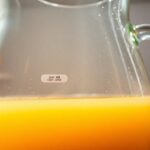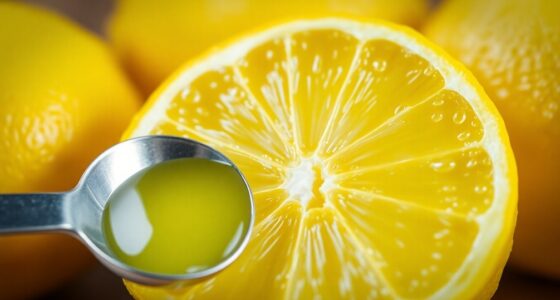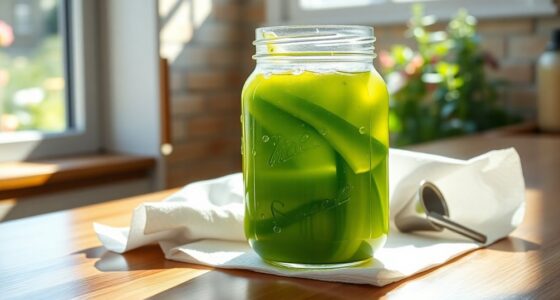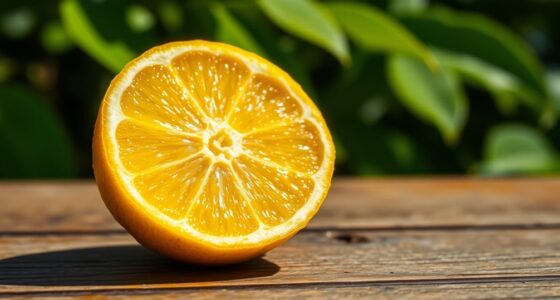After opening, store-bought apple juice stays good for up to 10 days in the refrigerator, while canned varieties should be consumed within 7 days. If you’ve got cold-pressed juice, use it within 2 to 3 days for the best taste. Always check for signs of spoilage, like a sour smell or visible mold. Proper storage makes a difference, so keep that juice sealed tight. Discover more helpful tips on extending your juice’s freshness. To further ensure that your juice remains at its best, store it in an airtight container and avoid leaving it out at room temperature for extended periods. When wondering how long apple juice stays fresh, it’s essential to consider the type of juice and its storage conditions. Additionally, always taste a small amount before consuming, as this can help you identify any subtle changes in flavor that might indicate spoilage.
Key Takeaways
- Store-bought apple juice lasts up to 10 days in the refrigerator after opening.
- Canned apple juice should be consumed within 7 days after opening.
- Cold-pressed apple juice has a shorter shelf life of 2 to 3 days after opening.
- Homemade apple juice is best consumed within a few days for optimal freshness.
- Always check for signs of spoilage, such as sour smell or visible mold, before consuming.
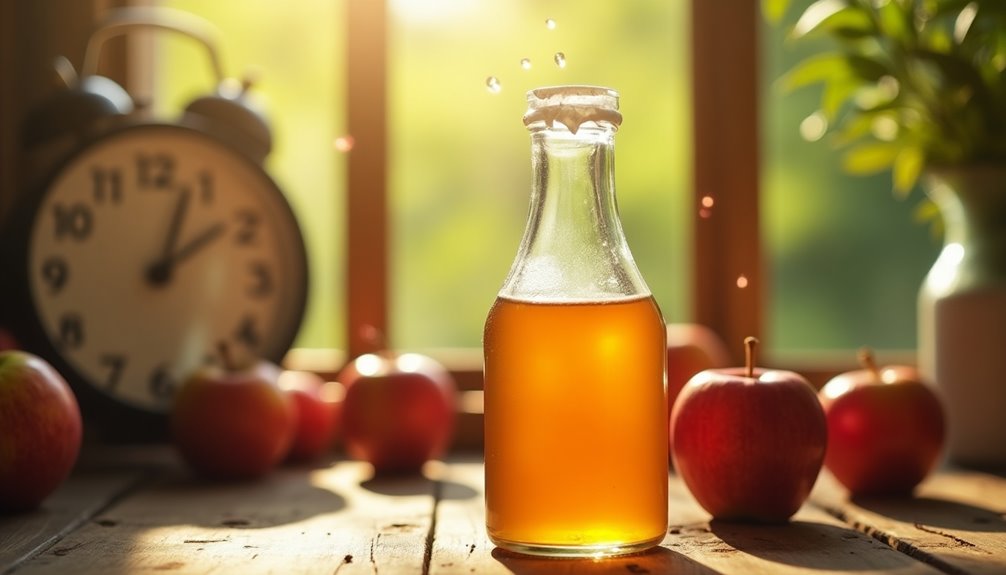
When you open a container of apple juice, you might wonder how long it stays fresh. Knowing the shelf life of opened apple juice is crucial for ensuring you enjoy its sweet taste without risking spoilage. Generally, if you've got a store-bought apple juice, you can keep it in the refrigerator for up to 10 days after opening. This applies to shelf-stable varieties, which are designed to last longer. However, for maximum safety and freshness, it's best to consume it sooner rather than later.
If you're dealing with canned apple juice, the rules change slightly. Once opened, you should aim to enjoy that delicious juice within 7 days. The shorter shelf life of canned varieties is due to the way they're processed and stored. You'll want to pay extra attention to how you store it after opening. Always make sure to seal it tightly, as exposure to air can lead to quicker spoilage.
Cold-pressed apple juice, often regarded as a more natural option, has an even shorter shelf life. After you've opened a bottle of cold-pressed juice, you typically only have about 2 to 3 days before it starts to lose its quality. This juice is less processed and tends to contain live enzymes and nutrients, which can make it more susceptible to spoilage. If you've opted for homemade apple juice, you might be in a similar boat. While the added acidity from freshly squeezed apples can help it last a bit longer, it's best consumed within a few days.
Regardless of the type of apple juice you have, always check for signs of spoilage before consuming. If your juice has developed a sour smell, a change in color, or any visible mold, it's a clear indication that it's time to toss it out. Trust your senses; they're your best defense against spoiled juice.
When storing opened apple juice, keeping it in the refrigerator is essential. The cold temperature slows down the growth of bacteria and other microorganisms that can lead to spoilage. Make it a habit to check your juice regularly if it's been sitting in your fridge for a while.
If you find you can't finish a container in time, consider using it in smoothies or other recipes to avoid waste.
Frequently Asked Questions
How Long Can You Keep Opened Apple Juice in the Fridge?
When you've opened a bottle of apple juice, you can keep it in the fridge for about 7-10 days.
To ensure it stays fresh, always seal the container tightly after each use.
If you've got cold-pressed juice, though, it's best to consume it within 2-3 days.
Before drinking, check for any signs of spoilage like off-odors or discoloration.
This way, you'll enjoy your juice at its best quality!
How Long Does Opened Juice Last in the Refrigerator?
Imagine your opened juice as a ticking clock, counting down its freshness. Once you crack that seal, it's best to keep an eye on the time.
Most opened juices last about 7-10 days in the refrigerator, but if it's cold-pressed, aim to drink it within 2-3 days.
Always remember to jot down the date you opened it; that way, you won't miss out on enjoying its taste at its peak!
How Long Is Martinelli's Apple Juice Good for Once Opened?
Once you open Martinelli's apple juice, it's best to drink it within 7 to 10 days for optimal freshness.
Make sure to keep it sealed tightly and store it in the refrigerator between 35°F and 40°F.
If you notice any signs of spoilage like mold, discoloration, or an off smell, don't consume it.
Tracking the opening date helps ensure you enjoy the juice at its best quality.
How to Tell if Juice Has Gone Bad?
Did you know that nearly 30% of juice consumers report experiencing spoilage issues?
To tell if your juice has gone bad, check for signs like mold, discoloration, or a sour smell. If you notice a cloudy appearance or fizz, fermentation might've occurred.
Also, listen for popping sounds or feel for expansion in the container. Regularly inspecting your juice will help you avoid unpleasant surprises and ensure you're drinking something fresh!
Conclusion
Once you open a bottle of apple juice, it's best to consume it within 7 to 10 days for optimal freshness. Did you know that pasteurized apple juice can lose up to 50% of its vitamin C within just a week? To enjoy the best flavor and nutritional benefits, keep your juice refrigerated and tightly sealed. So, go ahead and savor that refreshing drink, but don't wait too long—your taste buds will thank you!
Cindy thoroughly researches juicing trends, techniques, and recipes to provide readers with practical advice and inspiration. Her writing style is accessible, engaging, and designed to make complex concepts easy to understand. Cindy’s dedication to promoting the advantages of juicing shines through her work, empowering readers to make positive changes in their lives through the simple act of juicing.








